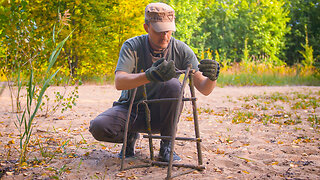Premium Only Content

Episode 2287: St. Paul - Who was Saul? - Part 2 by Nancy
My first episode on St. Paul was my own personal introduction to the topic whereby I made a connection between my experiences to that of Saul’s - but it was more focused on right before and right after his conversion. I had asked the question, what if I had a friend like St. Paul because I wondered hypothetically, with a very humanistic approach, what his family and friends thought about him after his conversion. Especially knowing who he was prior to that. Those of you who listened, kindly indulged me by letting me share my own experiences of the reaction of my family and friends to my new faith journey.
So we continue with St. Paul - Part 2: Finding Purpose in Change - Who was Saul? It is because Saul’s conversion was so epic and powerful that I felt the need to do a deeper dive into the man and who he was before his conversion. And this second episode sheds more light on the man Saul; how did Tarsus, the city in which he was born and lived affect who he was, and how did it affect his life and his work. After all, where we come from says a lot about who we are; it is a big part of what forms us, isn’t it? And so I was intrigued to see what I could find out about Saul of Tarsus.
Let’s take a quick look at the city of Tarsus, where Saul was born. Tarsus, is in today’s south-central Turkey, and has a rich history of being one of the oldest urban centers in the world. Established long before Saul was born, because of its location on the Mediterranean coast, Tarsus was an important seaport city and according to sources in my research was well protected by natural rock fortifications.
Rock fortifications means there were mountains and the mountains of Tarsus, like many mountains, were rich in minerals and lumber. The mountain slopes of Tarsus were inhabited by black goats and the hair from these black goats was used to weave a cloth called cilicium. Cilicium was used to make many things, one of the more popular items made was tents and we know from history that tent-making was the trade of Saul himself.
It’s important to know that Tarsus was a busy, bustling place where many people from the Roman Empire came to live and work and this made Tarsus a wealthy city. A wealthy city continues to draw people in and this means that more money gets invested in that city’s progress. A strong population demands a strong education system and a strong education system is a big draw for well-known educators. In fact, in doing my research for this episode I read the following passage from the doctoral paper of the Rev. Quency E. Wallace:
“Educators from all over the Roman empire came to teach at the schools of learning at Tarsus. Grecian, Egyptian, Roman, African, and many other scholars came, bringing their learning and culture with them. Tarsian merchants and others invested heavily in the education of Tarsian citizens, and no expense was spared in the recruitment of top educators from all over the empire.”
One source even called Tarsus an “Ivy League” learning community. So education in Tarsus was top notch and Saul was a product of such education. I am including all of this because I think it is important to know that Saul was no slouch.
He was born into a devout Jewish family but he was also born a Roman citizen and his family was well-known and wealthy. By the way, he was named Saul (after Israel’s first king) by his father and Saul’s father was a descendant of the ancient tribe of Benjamin. Now in those days, Roman citizenship was not automatic, but rather, inherited. Your family had to have four known generations or more in Tarsus in order to be a Roman citizen and this was the case for Saul - who was fortunate enough to inherit his Roman citizenship from his father. Being a Roman citizen had many advantages among which were being entitled to a fair trial along with the option for direct appeal to the emperor if you were not satisfied with the trial’s outcome. Being a Roman citizen also meant you could hold a government job, vote in Roman affairs, join the Roman legion or even become a member of the senate - again, not everyone from Tarsus had these advantages, especially among the Jews.
I came upon this statement about Saul on a BBC website, and I quote, “Here is a man who worked with his hands but wrote with the grace of a Greek philosopher; a Jewish zealot who nevertheless enjoyed the rights of citizenship in the world’s greatest empire,” end quote. That says quite a bit about this man and from where he came.
I did discuss in my introductory episode the incredible education that Saul received under Gamaliel, a premier teacher of his time, so we know, as I stated earlier, that Saul was very well-learned and one of the leading Jewish thinkers of his time. Let’s take a quick look at Saul the zealot, the Pharisee and member of the Sanhedrin.
Saul was known as a zealot, or one who is thought to be almost fanatical in their beliefs, and this was a pretty accurate description of Saul. He has been referred to as the Pharisee of Pharisees and he declares it himself in the Acts of the Apostles 23, well after his conversion. But what was a pharisee? I discovered many definitions that said similar things, the main of which being that Pharisees (the name Pharisee means separated one) separated themselves from society to study and teach the law, but they also separated themselves from the common people because they considered them religiously unclean. They were a scholarly class of people dedicated to the teaching of both the written and oral Law of Judaism. Now the Sanhedrin, of which Saul was a member, was a Jewish council that dealt with legal and religious matters and according to several sources, and I quote, “they played a significant role in the governance and religious affairs of the Jewish people in the first century.” (On a side note, the word “sanhedrin” comes from the Greek word “synedrion” which means assembly or council).
In fact, we can read in Matthew 26:57-59, “But they holding Jesus led him to Caiaphas the high priest, where the scribes and the ancients were assembled. And Peter followed him afar off, even to the court of the high priest. And going in, he sat with the servants, that he might see the end. And the chief priests and the whole council sought false witness against Jesus, that they might put him to death.”
Caiaphas was the high priest of the Sanhedrin at the time of Jesus’ trial and execution.
And in
Mark 14:55 that, “the chief priests and all the council sought for evidence against Jesus, that they might put him to death, and found none.”
And in
The Acts of the Apostles 6:12-15, in reference to bringing Stephen before the high court, “And they stirred up the people, and the ancients, and the scribes; and running together, they took him, and brought him to the council. And they set up false witnesses, who said: This man ceaseth not to speak words against the holy place and the law. For we have heard him say, that this Jesus of Nazareth shall destroy this place, and shall change the traditions which Moses delivered unto us. And all that sat in the council, looking on him, saw his face as if it had been the face of an angel.”
It is these scribes and priests and elders who comprised the Sanhedrin and in my introductory episode I also referred to when Stephen was martyred and Saul was present as part of the Sandhedrin.
Paul says later in Galatians 1: 14 of himself, “And I made progress in the Jews' religion above many of my equals in my own nation, being more abundantly zealous for the traditions of my fathers.”
He is speaking of himself and of the zeal in which he learned more than his equals and felt a calling to be zealous in defending and upholding the old law.
I am calling attention specifically to the passion and commitment that Saul had for his work as part of the Sanhedrin but also in the persecution of Christians. Saul, like many other Pharisees, thought that Jesus was in opposition to the law of Moses. In John 5:18 we read what the Pharisees thought Jesus was guilty of doing, “Hereupon therefore the Jews sought the more to kill him, because he did not only break the sabbath, but also said God was his Father, making himself equal to God.”
So not only did they believe that Jesus was not making holy the sabbath, but he was even putting himself in the place of God. To Saul and the Pharisees this was heresy. This also meant that if Jesus and his “New Way” did not stop what they were doing and start observing the old law that they should die. The Pharisees believed that Jesus and his disciples could cause God to bring down the wrong judgment on the rest of the people and maybe even prevent the coming of the Messiah.
The argument has been made that Jesus broke the Sabbath law but in fact he did not. We have to remember that Jesus was doing everything that God, the Father, wanted him to do - so the accusations against Jesus were just that - accusations based on misinterpretation by the legal minded Pharisees. Jesus did everything as was intended by God. It might be said that Jesus broke their understanding of the law. The Sabbath was meant to help one draw closer to God, so Jesus was certainly not acting out against that.
There is so much more that can be discussed in regard to the Law of Moses and the way the Pharisees interpreted and enforced these laws on the people - something for another episode, perhaps?
My main point in covering this is to try to help us understand just why Saul went after Christians with such impassioned fervor and zeal. So it is based on all of this - His entire background and upbringing, his education, his beliefs, morals and values as a Pharisee, his work as a member of the Sanhedrin - all of this - made him the man that he was.
Up until this point in my life I had no idea about any of this. About Tarsus, about Saul and where he came from, what he was like, why did he go on the attack of the followers of Jesus the way he did?
But now I know more about Saul prior to his conversion. I have a better understanding of why he was the way he was - that his thoughts and actions were based on the foundations of his upbringing, education and beliefs. Now I know why he went after the Christians with fervor and anger and force. Ah, but now I also know why his conversion was that much more powerful than any we have ever known.
I found a quote by St. Frances Xavier Cabrini who said, “Did a Magdalene, a Paul, a Constantine, and Augustine become mountains of ice after their conversion? Quite the contrary. We should never have had these prodigies of conversion and marvelous holiness if they had not changed the flames of human passion into volcanoes of immense love of God.”
And isn’t that an accurate description of Saul’s conversion? The flames of his human passion became a volcano of immense love of God.
I hope you will join me for my third episode on St. Paul - Finding Purpose in Change. I’d like to tell you exactly what I’ll be talking about, but that’s the beauty of this apostolate - I am forging a path in learning about St. Paul and I never know where it will lead me.
Until then, God bless you and thank you for listening.
-
 53:59
53:59
Tactical Advisor
2 hours agoThe Vault Room Podcast 009 | Everyone Getting $5000?!
12.1K4 -
 LIVE
LIVE
TheAlecLaceShow
13 hours agoLive at CPAC | Interviews with Dean Cain, Rep. Comer and more! | The Alec Lace Show
467 watching -
 LIVE
LIVE
Major League Fishing
2 days agoLIVE Tackle Warehouse Invitationals, Stop 1, Day 2
524 watching -
 LIVE
LIVE
I_Came_With_Fire_Podcast
10 hours agoNOC Spy: CIA uses SATANIC RITUAL ABUSE to make SLEEPER Cells
438 watching -
 28:42
28:42
CatfishedOnline
23 hours ago $0.85 earnedWoman Insists Morgan Wallen Relationship Isn't a Romance Scam!
6.98K -
 16:25
16:25
TSPLY
23 hours agoNew CNN / MSNBC Meltdown Moments Of Getting Mad At Donald Trump In February
12.8K8 -
 8:33
8:33
scoutthedoggie
3 hours agoAirsoft War Games Scotland
7.58K2 -
 4:56
4:56
Kirill MultitoolOfficial
1 day ago $0.67 earnedSurvival TIPS and usefull bushcraft DIY in the wild
15K3 -
 27:25
27:25
ArturRehi
1 day agoThis is How Dictatorships are Formed
8.13K2 -
 59:35
59:35
AlaskanBallistics
16 hours ago $0.28 earnedI Love this Gun Episode # 11
6.19K1